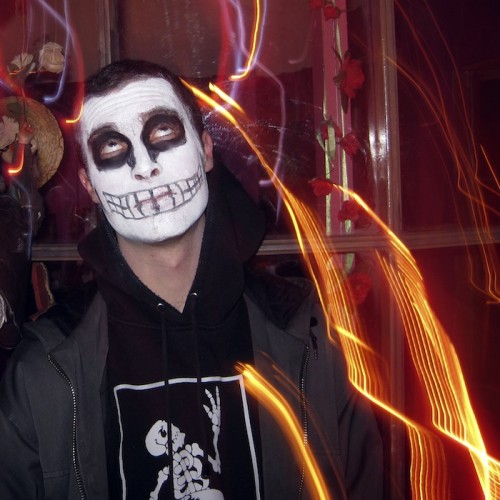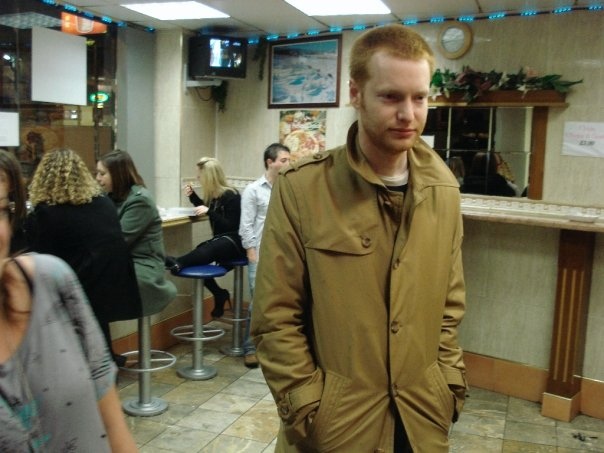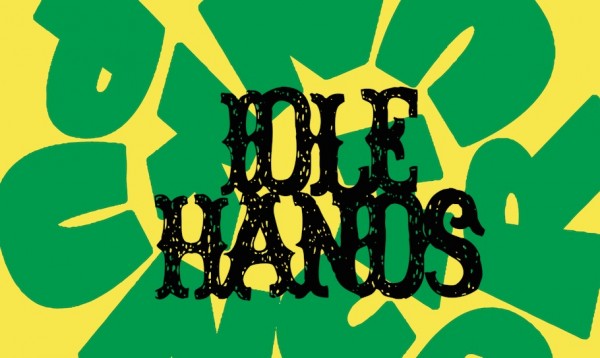Punch Drunk and Idle Hands label heads Tom Ford (aka Peverelist) and Chris Farrell respectively agreed to an extensive e-mail interview discussing the histories and futures of their labels.
How did the labels get started?
Tom Ford (Peverelist): I started the label [Punch Drunk] in 2006. The roots of a dubstep scene were planted by Pinch’s Context dances in the city and they stimulated the imagination of a group of producers who were interested in doing something different and pursuing their own musical destiny, which was what we all saw dubstep as — not a sound, but an opportunity to do your own thing and be accepted for it. I started the label as a platform for those producers to promote their music to the wider world. It’s always been a grassroots thing.
Chris Farrell: I have been working in record shops for years and DJing about the place so it was always in the back of my mind. Last year it kind of seemed like the right thing to do as there was music being made in Bristol that was closer to the house, techno and even disco that I used to regularly DJ around town, much more so than previously. I have always liked d‘nb, and from the first Tempa allstars 12” I have been hooked on what became dubstep, but it was always secondary to the music I was playing out at the time. First and foremost I love house and techno in their many different forms, from the old school sounds of Detroit and Chicago, through minimal and micro house and onto the modern Berlin sound. The label [Idle Hands] is just my take on good electronic music, and my attempt to weave something into that rich musical tapestry; Tom gave me a few pointers on the way and here we are about a year after the plan was first hatched.
Where do the names come from?
Tom: Punch Drunk: The feeling of standing by the speaker stack at 3rd Base in Brixton with an import Guinness in one hand and a zoot in the other getting pounded by Mala and Loefah dubplates.
Chris: Idle Hands: The name comes from the saying ‘idle hands are the devil’s plaything,’ or as Morrissey put it, “The devil will find work for idle hands to do.” When I set up the label I wasn’t working so much, so it is a bit like ‘this is what idle hands do’ and you know, they always say the devil has the best tunes!
What role do your positions in Rooted Records play in the managing of the labels?
Tom: Rooted is like a hub and an information centre, everyone passes through. I think it has brought a lot of people together whose paths otherwise might never have crossed.
Chris: Running the label and being at the shop feed back into each other. The label is influenced by the shop, that is: the records we listen to all day, the people we meet and the conversations we have all day. If by putting out records it helps raise the shop’s profile then that is a good thing. We are proud to still be going as one of the last record shops in Bristol, a lot have disappeared over the last few years.
Tom, what is the Punch Drunk ‘sound’ — how would you describe the label to someone who had never heard it before?
Tom: There is no specific sound to the label, all the artists have their own sound. What links all the artists is the context of where and how the music is played. It’s all drum and bass oriented soundsystem music around 140ish bpm.

Tom Ford aka Peverelist, in his work uniform
Chris, what is the Idle Hands ‘sound’ or aesthetic, particularly in opposition with Punch Drunk?
Chris: I don’t think they can be posed as oppositional. Punch Drunk is Pev’s thing, Idle Hands is mine. I set out with the intention of releasing interesting dancefloor tracks. There is maybe a shared commonality between the artists I put out, of wanting that little bit more from dance music than simply a soundtrack to get wasted to on the weekend – not much more, but enough! There is maybe a shared commonality between the artists I put out, of wanting that little bit more from dance music than simply a soundtrack to get wasted to on the weekend – not much more, but enough!
I am not interested in being too clever or too over the top, I don’t want to put out lots of ‘deep’ tracks. I just want to put out tracks that I get a vibe off, and ones I think over people will feel as well.
What about the releases on your labels makes them special, makes them worth buying?
Tom: It’s not run as a commercial operation. It documents a tangible culture, a community, reflects a history and hopefully narrates a future. We don’t rely on expensive packaging, high profile remixes or any other gimmicks to get people’s attention, it’s purely about music. People sometimes say to me, ‘I really like this release but don’t get this one’, which i understand, but I always try to explain that it all makes perfect sense within the context of Bristol culture.
Chris: Good music that makes you groove.
Are you looking for anything in particular when you look for tracks to release?
Tom: Bold ideas, great music, and originality & direction.
Chris: Just a buzz off the tracks,that is most important thing. I listen to so much music through work that tracks really have to excite me before I would consider putting them out – but I guess that is true of any label owner. I also like the idea of finding two tracks that sit together well on a 12.
Punch Drunk is obviously very closely associated with Bristol and the Bristol sound(s), what do you think of Punch Drunk as one of the definitive Bristol labels? Is this a deliberate move or is there just so much in Bristol you haven’t had to look outside yet? Would you consider releasing something by a non-Bristol artist?
Tom: The label was always intended as an outlet for people involved the the Bristol scene. We have had two 12s which were collaborations between Bristol and London artists, including the very first one, so it’s flexible. Bristol has had a long standing musical dialogue with London. I wouldn’t consider releasing a non Bristol based artist on the label, it’s not within our remit. I am not going to try to snap up a release from the latest net-hype-generated genre / blog pinup of the moment. The catalogue is a timeline and a document of some of the things that are going on in the town where I live and the people who go out and rep at the dances. In that sense I hope it is definitively contemporary Bristol and people might reflect back on it in future as just that. Obviously there is so much other stuff going on in Bristol too.
How does Idle Hands fit into the Bristol ‘sound’ and the Bristol scene? Do you feel that Idle Hands is primarily a Bristolian label or does it transcend geography?
Chris: I’m not so sure there is a Bristol sound really, a lot of good music has come out this city in the last thirty years in a lot of different styles. People point to the prevailing dub influence and I guess that is true, but Bristol is not unique in its love of dub and sound system culture. Most modern dance music owes some debt to Jamaica and dub techniques.
Idle Hands is a Bristol label in the fact that I live here and don’t intend moving anytime soon. It makes sense to support local artists first and foremost, as they are the people you see down the pub – and at the moment there are a lot of talented producers supping pints of cider all over Bristol. That is not to say I will only release Bristolian music, it’s just at the moment that makes the most sense to me. I have always viewed electronic dance music as a truly international music, one where it doesn’t matter where you come from as long as you have something to offer. For example, at the moment there seem to be a lot of good Russian producers making drum and bass and dubstep, but in opposition to that, when was the last time you listened to a Russian rock band? Hopefully by what I am doing (along with the other labels in Bristol) is presenting music from this corner of the world and giving it an audience around the globe, seeking out fellow travelers along the way, building links and keeping things moving.

Chris Farrell, head of Idle Hands. Photo by Tulane Blyth.
Would you consider your labels ‘dubstep’ labels, and if not, what are they?
Tom: Yes, but only by my definition of dubstep. Music drawn from the legacy of UK soundsystem culture, UK reggae & dancehall, Jungle, Garage, Grime and onwards.
Chris: That is certainly the background the artists come from, but it’s bit of a controversial term these days isn’t it? Everything was so much easier when everyone was making halfstep! I think things are in flux at the moment and part of that is people fretting about genre names and their applicability. I don’t really have a problem with genre, because humans need to categorize things to make life easier, but I can’t be arsed to think of a genre name to pin down some of the newer strains that are emerging. I generally tell people I play techno, and I guess that could go for the label as well, but that term means different things to different people. I see it as quite a broad church! It is probably just easier to call it electronic dance music and be done with it.
In a world where so much music is freely available so quickly, what is the purpose of a record label? Do you think they are still relevant?
Tom: The purpose of a record label was always about collective identity and I think that still counts for a lot. Music production is very accessible now, so much more so than when I started to get into making music. The result is thousands of new tracks being made everyday, I think a record label’s job is to filter out the best tracks. This is also why independent record shops are so important too, they have the knowledge to stock only the best tracks and labels. Otherwise finding good new music would be like finding a needle in a haystack. The signal to noise ratio is very low in the internet age.
Chris: I think the traditions built up in this country from post-punk and onwards are something to be cherished. That is, the independent labels and distribution channels which have allowed underground music to develop and thrive in the UK. I feel that labels still have a role to play in the twenty-first century, in terms of selecting and presenting music to the public in the best possible way. Treating good music the way it deserves to be treated with decent mastering (big up Optimum in Bristol) and well-cut records.
Thoughts on file sharing?
Tom: I think it has devalued music. I think it has devalued the experience of listening to music. I can’t say for certain how it affects or has affected Punch Drunk or Rooted Records, but I do know that the independent underground music ‘industry’ has taken a battering over the last ten years and what people have worked hard to build is now very fragile and i don’t think that is to the benefit of music fans on any level.
Chris: I missed out on file sharing when people were getting into it, I didn’t have a computer for years and years and it is not something I do now that I have one. I like listening to music on vinyl. I wish more people did the same but I guess times change. I would tend to agree with Pev that it has devalued music.
What about vinyl vs. digital?
Tom: Punch Drunk releases digitally because it is only right that the music is available in the format that people want to listen to it in. I like to listen to music on vinyl because i think that the listening experience is different. It is more interactive and involved and vinyl is much more fun to DJ with. Real music heads buy vinyl, which is why every producer wants to put out vinyl even if they don’t play or buy it themselves.
Chris: I like vinyl and I think there is still a life in it, but it is getting harder for labels to survive for sure. My dad has always had hundreds of records, he’s big into soul in its many forms as well as reggae and some other bits of stuff. When I was a kid he gave me a box of punk 7”s, and pointed me in the direction of dub and reggae when I was a teenager. I was chatting in the pub the other day to my mate and realized that the first person to play me NWA was my Dad! So I have grown up with it being around. I love seeking out records in shops and I always have a mental ‘wants’ list. If I go to a new town the first thing I seek out is record shop (then a pub, and then a bookshop). They can be expensive but they still represent good value for money considering the amount of times you will listen to that record (only if it is good of course) much more so than a DVD or a computer game.
And all that really matters: vinyl sounds much better.
Were there any labels that you were inspired by or modeled your actions after a little bit?
Tom: Nothing specific, I’m inspired by the history of the UK independent music movement, from its post-punk origins through the UK dance music revolution up to the present. People doing their own thing.
Chris: Seeing what Pev [Tom] was doing helped me see what was possible, but in terms of being modeled on anyone else I don’t think so.
Tom, tell me a bit about Unearthed — where the idea came from, the point of re-releasing these tracks, etc.
Tom: I wanted to make some tunes available on vinyl again that hadn’t been around for a long time and / or had never had a decent pressing. Tunes that are important and relevent to me in the context of Bristol’s musical past. There is a whole generation out there who might have never heard the tracks before.
Are there any more Unearthed releases planned
Tom: I hope so, yes.
You’ve got the Guido album coming out right now, which is the label’s third LP. What’s the difference between releasing singles and albums, what to you is the purpose of an album and do you see Punch Drunk releasing more of them in the future?
Tom: The difference is, albums cost a small fortune to put together and take a massive amount of work to produce and promote. I think an album is a much more substantive artistic statement than a 12″ and that in itself is worthwhile.
What can we expect in the future?
Tom: There is a new 12″ by myself coming in July ‘Better Ways of Living’ / ‘Fighting Without Fighting’. Clips on the soundcloud www.soundcloud.com/punchdrunkrecords
Chris: The next release is from Headhunter and should be out in the autumn, following that should be a new 12” from Kowton and then something that October and I have been working on.
I have also been working with Kowton and October as a trio making bass heavy, jacking house music that should see the light of day at some point.
Are there any other labels run out of Rooted Records besides Punch Drunk, Unearthed, and Idle Hands? What other contemporary labels do you feel an affinity with, if any?
Tom: No, that is it at present. I feel an affinity with any label with strong ideas and a strong ideology. At Rooted, we are into all kinds of music. I don’t feel the need to name check anyone, we are always happy to chat about music in the shop and recommend what we feel are the best records in the world at any given moment.
Tom, what do you think of Idle Hands and how does it differ from Punch Drunk?
Tom: Chris has very eclectic taste and a huge music knowledge across many genres. He wants Idle Hands to be an underground dance music label without boundaries. It’s a breeding ground – joining the dots. In many ways we feel the underground is back to square one again and Idle Hands reflects that.
Finally, what would you consider the most ‘important’ Punch Drunk release, and what is your own personal favourite?
Tom: The most important Punch Drunk release was the first one. I like all of them.

